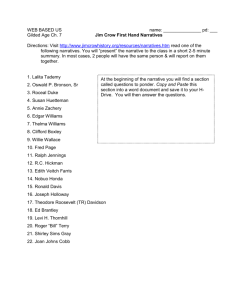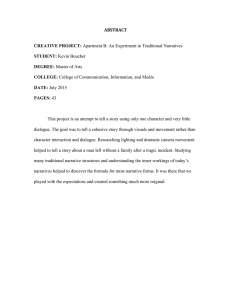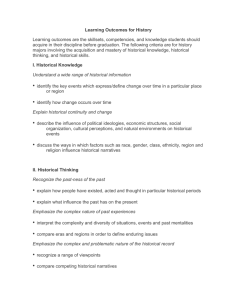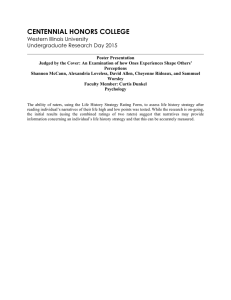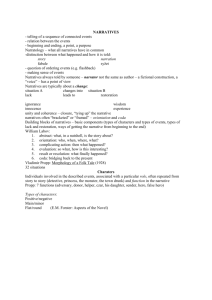Gender Stereotyping & Sexism: Analysis of 'Nervous Conditions'
advertisement
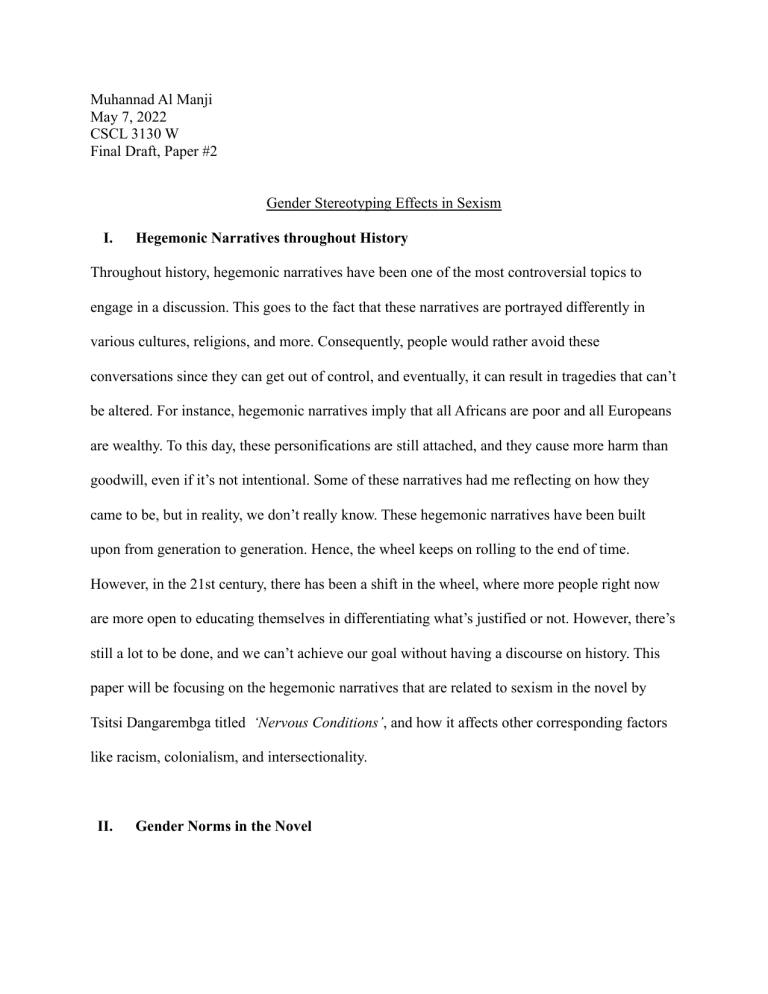
Muhannad Al Manji May 7, 2022 CSCL 3130 W Final Draft, Paper #2 Gender Stereotyping Effects in Sexism I. Hegemonic Narratives throughout History Throughout history, hegemonic narratives have been one of the most controversial topics to engage in a discussion. This goes to the fact that these narratives are portrayed differently in various cultures, religions, and more. Consequently, people would rather avoid these conversations since they can get out of control, and eventually, it can result in tragedies that can’t be altered. For instance, hegemonic narratives imply that all Africans are poor and all Europeans are wealthy. To this day, these personifications are still attached, and they cause more harm than goodwill, even if it’s not intentional. Some of these narratives had me reflecting on how they came to be, but in reality, we don’t really know. These hegemonic narratives have been built upon from generation to generation. Hence, the wheel keeps on rolling to the end of time. However, in the 21st century, there has been a shift in the wheel, where more people right now are more open to educating themselves in differentiating what’s justified or not. However, there’s still a lot to be done, and we can’t achieve our goal without having a discourse on history. This paper will be focusing on the hegemonic narratives that are related to sexism in the novel by Tsitsi Dangarembga titled ‘Nervous Conditions’, and how it affects other corresponding factors like racism, colonialism, and intersectionality. II. Gender Norms in the Novel Gender narratives are prominent in the entirety of the novel. In fact, these narratives are illustrated early in the novel throughout Tambu’s childhood. In chapter 1 of the novel, Tambu describes her relationship with her family but primarily her brother while she was growing up. This chapter resonates with hegemonic narratives that females should be obedient to the commands of males. Tambu narrates a story about a particular evening in which her older brother Nhamo has crossed the line by asserting his dominance over his younger sisters. Abuse of power would be the precise term to define it. To elaborate, Nhamo had coerced his sisters to pick up his luggage even though he had the capability to do it by himself. Tambu says, “Knowing that he did not need help, that he only wanted to demonstrate to us and himself that he had the power, the authority to make us do things for him.” (Dangarembga 23) Tambu’s assessment of Nhamo indicates that he had taken advantage of the women in his family since he had the power to do it. III. Gender Stereotype’s involvement with sexism Consequently, I have done my own research by examining how these norms began to be deemed morally justifiable. An article by Christia Brown and Ellen Stone focuses on the different forms of sexism, and how sexism impacts development. The article mentions that gender stereotypes, discrimination, and other factors are the major causes of this issue. Gender normalities pressure children to behave in a particular way over the other. For instance, when a boy is told not to cry, “be a man” is detrimental to how a child’s mental health and as well to his development (Brown & Stone 106). Furthermore, the article goes over a series of case studies that compare the effects and the relevancy of sexism in different areas of society. The main findings of the case studies have distinguished that hegemonic narratives for sexism have been deemed contradictory to its claims. For example, although the researchers found that girls are labeled as the “ideal student” and achieve higher grades than boys, girls are underrepresented in the STEM field (Brown & Stone 110). This goes to the fact that sexual attitudes are often expressed in differential behaviors toward the genders. That has been the case even before the baby is born. In the real world, studies have shown that more parents wish to have a boy over a girl since they are more economically advantaged in society. These Discoveries are relevant to Tambu’s struggle with pursuing an education as a woman in her family. While Tambu was growing up, her mother had begun to discourage her from her pursuit of pursuing an education. Tambu’s mother’s antics were harsh. Her mother told Tambu once, “and do you think you are so different, so much better than the rest of us? Accept your lot and enjoy what you can of it. There is nothing to be done.” (Dangarembga 38) As a child, these words could shift the entire perception of how you view things, and consequently, it had impacted Tambu in a way that she was more motivated than ever before. IV. Conclusion In conclusion, many factors translate into constructing a dysfunctional society as illustrated in the theme of ‘Nervous Conditions’. However, having discourses and examining the cracks in the system helps internalize the solutions, and assures that these disparities will dissolve to dust in the future. Work Cited Dangarembga, Tsitsi. Nervous Conditions. Faber & Faber, 2021. Horn, Stacey, et al., editors. “Equity and Justice in Developmental Science: Theoretical and Methodological Issues.” Advances in Child Development and Behavior, 2016, https://doi.org/10.1016/s0065-2407(16)x0002-x.

